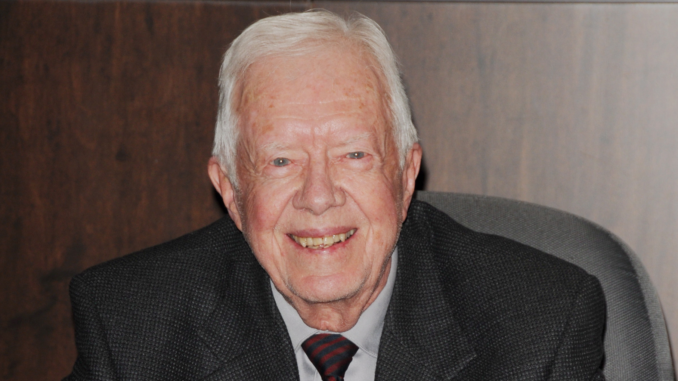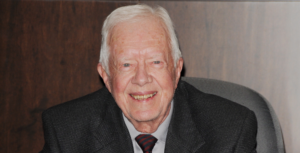
James Earl Carter Jr., known to the world as Jimmy Carter, the 39th President of the United States, has passed away at the age of 100. Surrounded by his family at his beloved home in Plains, Georgia, Carter’s peaceful departure marks the end of an extraordinary life of public service, both to his country and to the global community. His legacy is one of dedication, kindness, and perseverance, and his passing leaves a lasting impact on the world.
A Legacy Rooted in Service
Born on October 1, 1924, in Plains, Georgia, Carter was the first U.S. president born in a hospital. His mother, Lillian, worked as a nurse at the Wise Sanitarium, which was later renamed the Lillian G. Carter Health and Rehabilitation Center in her honor. Raised in a rural community where his family struggled with the challenges of poverty, Carter’s roots were grounded in hard work, integrity, and an enduring sense of social justice.
The Carter family, primarily cotton farmers, settled in Archery, Georgia, where young Jimmy helped manage a small peanut farm. He earned a reputation as a diligent worker, building strong relationships with those around him and renting parts of his land to help local farmhands. Carter’s early experiences shaped his deep commitment to the values of community and equality, which would guide him throughout his life.
As a student, Carter excelled academically and developed a love for reading. He played basketball in high school, but his academic path was temporarily derailed when he was disqualified from being class valedictorian for skipping school to ride in a “hot rod”—a youthful indiscretion that would later be remembered with humor. His true passion for knowledge and service, however, led him to Georgia Southwestern College and later the prestigious U.S. Naval Academy, where he would begin his lifelong journey of public service.

A Life of Dedication to Country and Family
Carter’s naval career began in 1943, where he attended the U.S. Naval Academy and graduated in 1946 with a Bachelor of Science degree. It was at the Academy that he met Rosalynn Smith, a lifelong love whom he married in 1946. Their partnership would become a cornerstone of his life, as Rosalynn played a pivotal role in his political career.
Carter’s naval service took him across the United States, from Virginia to Hawaii to California, and included assignments aboard submarines such as the USS Pomfret and the USS Barracuda. His time in the Navy, particularly his work with Captain Hyman G. Rickover on the development of the U.S. nuclear submarine program, had a profound influence on his views on science and peace. Carter also played a role in cleaning up the aftermath of a nuclear accident at Chalk River Laboratories, an event that led him to later oppose the development of the neutron bomb.
In 1953, following the death of his father, Carter left active duty to return to Georgia and take care of the family’s peanut farm. He continued his service in the Navy Reserve, earning several honors for his contributions.
Political Rise: From Governor to President
Carter’s entry into politics was driven by his desire to make a difference in his community and beyond. In 1963, he was elected to the Georgia Senate, and in 1971, he became the governor of Georgia. His time as governor was marked by a commitment to education, integration, and public service.
In 1976, Carter made a successful bid for the presidency, defeating incumbent Gerald Ford in a narrow election. As president, Carter was known for his calm demeanor, intellectual rigor, and focus on human rights and social justice. His administration established the Departments of Energy and Education, laid the foundation for a national energy policy, and worked to secure peace in the Middle East, most notably through the Camp David Accords.
However, his presidency was also marked by significant challenges, including the Iran Hostage Crisis, the Soviet invasion of Afghanistan, and the 1979 energy crisis. Despite these setbacks, Carter’s dedication to diplomacy and his unwavering principles set him apart from many of his peers in Washington.
A Life Beyond the White House: Humanitarian and Peacemaker
After losing the 1980 election to Ronald Reagan, Carter continued a life of public service. He wrote over 30 books, founded the Carter Center in 1982, and became a leading advocate for human rights, global health, and peace. His efforts to combat diseases like Guinea worm disease and his work with Habitat for Humanity earned him widespread admiration.
In 2002, Carter was awarded the Nobel Peace Prize for his lifelong dedication to finding peaceful solutions to international conflicts, advancing democracy, and promoting human rights. His work with the World Health Organization and other global organizations further solidified his reputation as a tireless champion for humanity.
Despite battling health issues in his later years, including surviving brain cancer in 2015, Carter remained active into his 90s. He continued teaching Sunday School at the Maranatha Baptist Church in Plains and worked with organizations dedicated to improving global health, justice, and peace. His marriage to Rosalynn, the longest in presidential history, remained a testament to their love and partnership.
A Grateful Nation Mourns
Jimmy Carter is survived by Rosalynn, his children James, Jack, Donnell, and Amy, as well as 11 grandchildren and 14 great-grandchildren. His passing marks the end of a remarkable chapter in American history, one that was defined by integrity, compassion, and an unwavering commitment to the service of others.
As the nation mourns the loss of the oldest living president, we remember Jimmy Carter not just for his time in the White House but for his lifelong dedication to making the world a better place. His legacy is one of peace, justice, and service, and his impact will continue to be felt for generations to come. Rest in peace, Mr. President, and thank you for your service.
